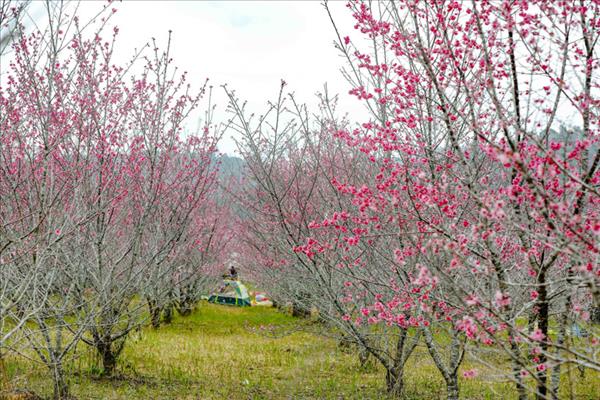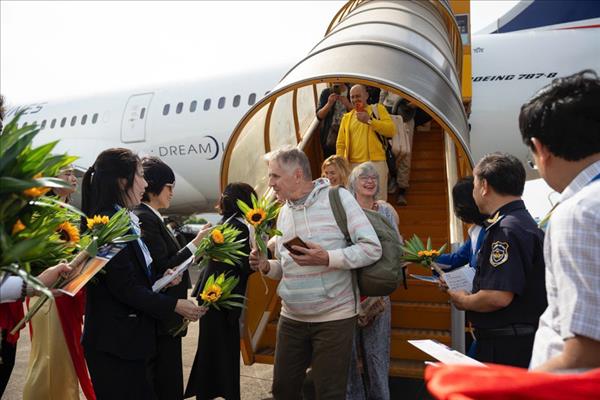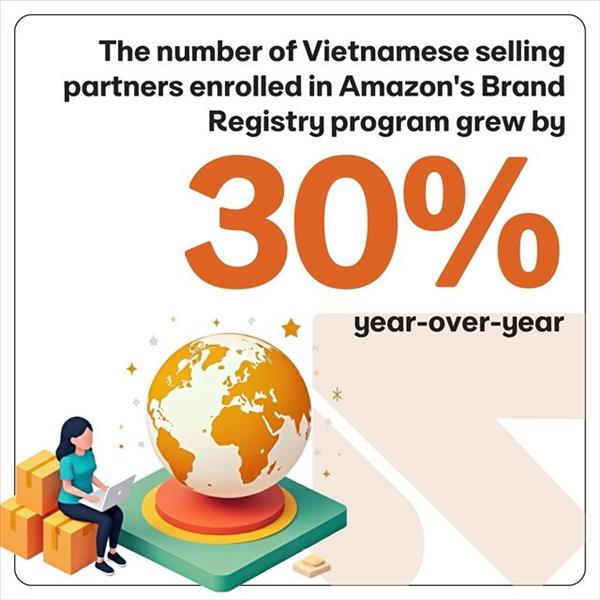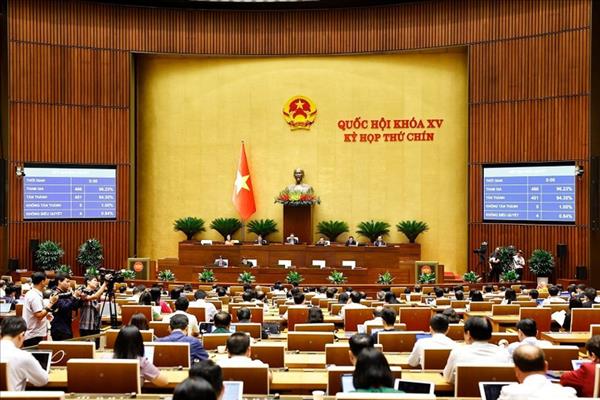Vietnam and the UK have substantial cooperation opportunities in the fulfillment of green growth targets, British Ambassador Gareth Ward has affirmed.
In a recent interview granted to the Vietnam News Agency (VNA), the diplomat said Vietnam is facing a slew of challenges like increased salinity levels and extreme weather events, and the “very dynamic economy” needs energy to continue its economic development.
“So against that background, it's a big challenge to get the climate policy right,” he said.
The ambassador, therefore, said he is very impressed by the commitments set out by Prime Minister Pham Minh Chinh at the 26th United Nations Climate Change Conference of the Parties (COP26) in Glasgow, the UK, last November.
In his remarks, PM Chinh said as a developing nation, Vietnam has embarked on industrialisation for over the past three decades.
With advantages in renewable energy, Vietnam will build and roll out measures to cut greenhouse gas emissions by its own resources, together with international cooperation and support, especially from developed countries, in terms of both finance and technological transfer, the PM said, stressing that the move is to achieve net-zero emissions by 2050.
“So there's a lot of work that we can do together. And the international community also increased its commitment to provide finance to developing countries, such as Vietnam,” Ward said.
Specifically, the UK has announced new funding for the ASEAN Green Climate Fund, which will provide good investment opportunities in the renewable energy sphere.
“We want to work with Vietnam and other big donors and institutions like the World Bank, the Asian Development Bank, and other partners to ensure the climate finance is flowing to Vietnam, particularly to the grid,” he stressed.
The ambassador added that there are lots of private sector companies that want to invest in solar power in wind power, helping Vietnam to green its economy.
Regarding the Vietnam-UK strategic partnership in 2021, Ward said despite the COVID-19 pandemic, the relations have made a lot of progress in politics, security and economy.
He highlighted the exchange of delegations in the year, notably the trip to the UK by Prime Minister Pham Minh Chinh from October 31 to November 2, and the official visit to Vietnam by British Secretary of State for Defence Robert Ben Lobban Wallace in July.
As members of the UN Security Council, Vietnam and the UK had exchanges of ideas on a lot of global security issues, according to the ambassador.
The highlight of last year was the signing and implementation of the UK-Vietnam Free Trade Agreement, which officially took effect from May 1 and is creating opportunities to businesses of both sides.
“So this is an excellent time for Vietnamese businesses to be exporting to the UK and British businesses to be exporting to Vietnam,” he said, noting that the UK hopes to share its experience with Vietnam in high tech, e-commerce and financial technology.
For the COVID-19 fight, the ambassador said Vietnam has done "very well” in speeding up its vaccination programme, which has saved many lives in the Southeast Asian nation.
“The number one achievement is having a high vaccination rate,” he said. “Your vaccination rate is the same as or perhaps even higher than the UK. So that's an excellent achievement.”
In addition, Vietnam has also modified procedures of tracking and tracing to make sure that it can be balanced against living with COVID-19.
He suggested the country focus on supporting the economic recovery and getting children back to school in 2022.
So far, the UK has donated over 700,000 vaccine doses to Vietnam and more will come to the country via the COVAX Facility. The UK has also presented equipment to Vietnamese hospitals, particularly electronic monitors and electronic dosage pumps, which help give a good standard of treatment to the small number of people who unfortunately get very ill with the disease.
The UK will continue to support Vietnam in the pandemic combat, and coordination in science and technology, especially in tracking new variants, the ambassador pledged.
The British Embassy said more than 2 million doses of AstraZeneca COVID-19 vaccine donated by the UK via the COVAX Facility arrived in Vietnam on January 25, helping the country speed up its large-scale vaccine rollout and accelerate economic reopening./
In a recent interview granted to the Vietnam News Agency (VNA), the diplomat said Vietnam is facing a slew of challenges like increased salinity levels and extreme weather events, and the “very dynamic economy” needs energy to continue its economic development.
“So against that background, it's a big challenge to get the climate policy right,” he said.
The ambassador, therefore, said he is very impressed by the commitments set out by Prime Minister Pham Minh Chinh at the 26th United Nations Climate Change Conference of the Parties (COP26) in Glasgow, the UK, last November.
In his remarks, PM Chinh said as a developing nation, Vietnam has embarked on industrialisation for over the past three decades.
With advantages in renewable energy, Vietnam will build and roll out measures to cut greenhouse gas emissions by its own resources, together with international cooperation and support, especially from developed countries, in terms of both finance and technological transfer, the PM said, stressing that the move is to achieve net-zero emissions by 2050.
“So there's a lot of work that we can do together. And the international community also increased its commitment to provide finance to developing countries, such as Vietnam,” Ward said.
Specifically, the UK has announced new funding for the ASEAN Green Climate Fund, which will provide good investment opportunities in the renewable energy sphere.
“We want to work with Vietnam and other big donors and institutions like the World Bank, the Asian Development Bank, and other partners to ensure the climate finance is flowing to Vietnam, particularly to the grid,” he stressed.
The ambassador added that there are lots of private sector companies that want to invest in solar power in wind power, helping Vietnam to green its economy.
Regarding the Vietnam-UK strategic partnership in 2021, Ward said despite the COVID-19 pandemic, the relations have made a lot of progress in politics, security and economy.
He highlighted the exchange of delegations in the year, notably the trip to the UK by Prime Minister Pham Minh Chinh from October 31 to November 2, and the official visit to Vietnam by British Secretary of State for Defence Robert Ben Lobban Wallace in July.
As members of the UN Security Council, Vietnam and the UK had exchanges of ideas on a lot of global security issues, according to the ambassador.
The highlight of last year was the signing and implementation of the UK-Vietnam Free Trade Agreement, which officially took effect from May 1 and is creating opportunities to businesses of both sides.
“So this is an excellent time for Vietnamese businesses to be exporting to the UK and British businesses to be exporting to Vietnam,” he said, noting that the UK hopes to share its experience with Vietnam in high tech, e-commerce and financial technology.
For the COVID-19 fight, the ambassador said Vietnam has done "very well” in speeding up its vaccination programme, which has saved many lives in the Southeast Asian nation.
“The number one achievement is having a high vaccination rate,” he said. “Your vaccination rate is the same as or perhaps even higher than the UK. So that's an excellent achievement.”
In addition, Vietnam has also modified procedures of tracking and tracing to make sure that it can be balanced against living with COVID-19.
He suggested the country focus on supporting the economic recovery and getting children back to school in 2022.
So far, the UK has donated over 700,000 vaccine doses to Vietnam and more will come to the country via the COVAX Facility. The UK has also presented equipment to Vietnamese hospitals, particularly electronic monitors and electronic dosage pumps, which help give a good standard of treatment to the small number of people who unfortunately get very ill with the disease.
The UK will continue to support Vietnam in the pandemic combat, and coordination in science and technology, especially in tracking new variants, the ambassador pledged.
The British Embassy said more than 2 million doses of AstraZeneca COVID-19 vaccine donated by the UK via the COVAX Facility arrived in Vietnam on January 25, helping the country speed up its large-scale vaccine rollout and accelerate economic reopening./
VNA/VNP

















